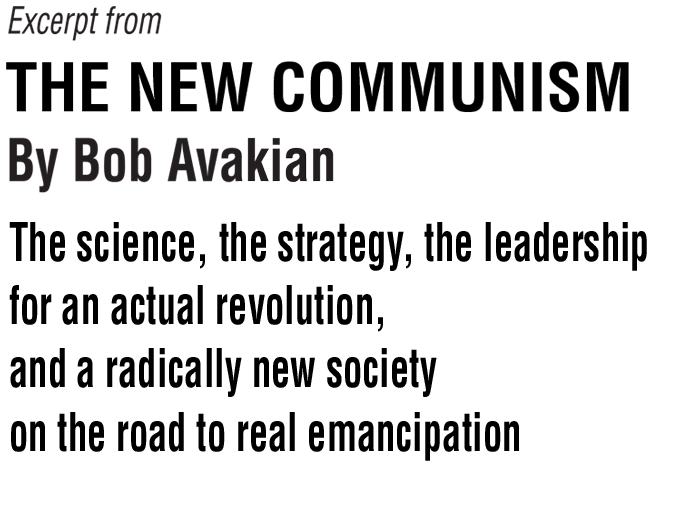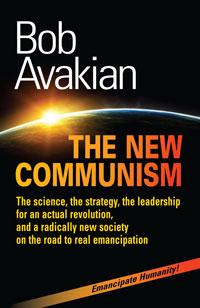
The following is an excerpt from the work by Bob Avakian, The New Communism. In addition to this and other excerpts posted on revcom.us, we will be running further excerpts from time to time on revcom.us. These excerpts should serve as encouragement and inspiration for people to get into the work as a whole, which is available as a book from Insight Press and as a PDF online at revcom.us.


This excerpt comes from the section titled "II. Socialism and the Advance to Communism: A Radically Different Way the World Could Be, A Road to Real Emancipation."
The last thing I want to say under this Part II, about the new society, is the point that’s made in the Ajith polemic (“Ajith—A Portrait of the Residue of the Past” in Demarcations #4), where it speaks to the fact that this formulation, “emancipators of humanity,” is not just a nice sounding phrase, or just a moral declaration—that we should be emancipators of humanity in some abstract moral sense. It’s not just that it’s better to be an emancipator of humanity than to be out for revenge. Well, yes it is better. But the point—and the point that’s made in that polemic against Ajith—is that a tremendous amount of complexity, a tremendous amount of analysis and synthesis of contradictions, is concentrated in this seemingly simple formulation, “emancipators of humanity.” Interestingly, and significantly, in the Ajith polemic this actually comes in the section under the heading “‘Simple Class Feelings’ and Communist Consciousness.” This is posed as a contradiction, which it is, objectively, in the real world. In other words, simple class feelings—hatred of oppression, a desire to get out from oppression—that’s not the same thing as communist consciousness. People like Ajith argue that, out of the position of the oppressed in society, and their basic class feelings, the consciousness that you need for revolution, for what he conceives of as communist revolution, will more or less spontaneously emerge—or that, in any case, the oppressed have a special ability and a special predisposition, so to speak, to grasp communist consciousness. And the point’s made, in this polemic against Ajith, that there’s a qualitative difference, and a leap involved, between simple class feelings and actually becoming a conscious emancipator of humanity, having communist consciousness. People are oppressed, they have basic feelings as a result. And many people are not so narrow-minded. You’ll hear people say: “This has to stop, not just here, but all over the world.” People have sentiments that come out of their conditions where they do identify with other oppressed people. And, as emphasized in this polemic, those basic sentiments are something very important that we have to unite with; but we also have to carry on struggle for people to make a leap beyond just simple class feelings, because that’s not the same thing as really understanding the world as it is, and as it is moving and changing, and what is the necessary means for moving beyond the world as it is. There’s a vast difference. Everybody who’s been through that process of making that leap, or is in the process of making that leap, knows it’s a big deal, that it isn’t just the same thing as how you feel when you start to recognize how much you’re being messed over, or how other people are being messed over, and something’s gotta be done about that. That’s a very important sentiment, but there’s a big leap from that to really, scientifically, understanding the need and the possibility to radically transform the world to emancipate humanity.
The fact that there is a lot of complexity concentrated in this formulation “emancipators of humanity”—that is true in two senses: First of all, it’s emancipators of humanity. This was taken partly from Marx’s statement, that the proletariat can only emancipate itself by emancipating all of mankind. In other words, you have to transform the whole world. You have to achieve the “4 Alls”—on a world scale—or else the proletariat, as a class, will remain in its exploited condition because, as long as you have this system in effect, as long as those are the fundamental relations and the process of capitalist accumulation constitutes the underlying and fundamental dynamics that sets the stage for things, you’re going to have an exploited class of people, of necessity. Only by abolishing all that, throughout the world, achieving the “4 Alls” in that sense on a worldwide scale, can those people who are the exploited class of proletarians actually emancipate themselves. You can’t do the one without the other. So there is that dimension, and obviously that includes the whole dimension of internationalism, as I was speaking to earlier, referring to BAsics 2:1247 and related points.
But there’s also another dimension, which is the whole question of what goes into actually transforming society. In other words, the achievement of the “4 Alls” in that sense—not just in terms of internationalism, but in terms of what goes into really uprooting the basis for exploitation and oppression—let’s put it that way. When you talk about emancipators of humanity, that’s concentrating everything that goes into carrying out this radical transformation—and, yes, this is posed against just taking revenge. That’s one of the important ways in which this formulation was brought forward, the way in which it is directly posed against the idea that this revolution is about taking revenge—taking revenge on the current exploiters, or taking revenge on anybody who’s a little bit better off than you are, and so on. This revolution is not about that. It is about getting to a whole different world where all these things that go on now no longer have a basis and can’t go on any longer. That’s what this is about, and when we say that we are calling on people to be emancipators of humanity, we’re calling on them to fight through to achieve all that. So, it’s the “4 Alls” in that sense too—to achieve everything that’s concentrated in those “4 Alls” is what it means to be an emancipator of humanity. It means to bring into being a whole different world, without all these economic relations of exploitation, without all these class distinctions, without all these social relations of oppression, without all the ideas that arise from and reinforce these relations of exploitation and oppression. All that, as well as the whole international dimension, is concentrated in the formulation, and the call to people, and the struggle with people, to not just be fighting to get rid of a particular form of oppression that might affect you more directly, or the group of people in society that you are most directly a part of and might be spontaneously more concerned about, but to uproot and move beyond all of this. This world is not a world that anybody should have to live in. And there is a basis to move beyond all of this, but it’s a tremendous struggle, and that’s what we have to win people to see, and to fight for.
47. BAsics 2:12
“The achievement of [the necessary conditions for communism] must take place on a world scale, through a long and tortuous process of revolutionary transformation in which there will be uneven development, the seizure of power in different countries at different times, and a complex dialectical interplay between the revolutionary struggles and the revolutionization of society in these different countries...[a dialectical relation] in which the world arena is fundamentally and ultimately decisive while the mutually interacting and mutually supporting struggles of the proletarians in different countries constitute the key link in fundamentally changing the world as a whole.”
BAsics, from the talks and writings of Bob Avakian [back]
Contents
Publisher's Note
Introduction and Orientation
Foolish Victims of Deceit, and Self-Deceit
Part I. Method and Approach, Communism as a Science
Materialism vs. Idealism
Dialectical Materialism
Through Which Mode of Production
The Basic Contradictions and Dynamics of Capitalism
The New Synthesis of Communism
The Basis for Revolution
Epistemology and Morality, Objective Truth and Relativist Nonsense
Self and a “Consumerist” Approach to Ideas
What Is Your Life Going to Be About?—Raising People’s SightsPart II. Socialism and the Advance to Communism:
A Radically Different Way the World Could Be, A Road to Real EmancipationThe “4 Alls”
Beyond the Narrow Horizon of Bourgeois Right
Socialism as an Economic System and a Political System—And a Transition to Communism
Internationalism
Abundance, Revolution, and the Advance to Communism—A Dialectical Materialist Understanding
The Importance of the “Parachute Point”—Even Now, and Even More With An Actual Revolution
The Constitution for the New Socialist Republic in North America—
Solid Core with a Lot of Elasticity on the Basis of the Solid Core
Emancipators of HumanityPart III. The Strategic Approach to An Actual Revolution
One Overall Strategic Approach
Hastening While Awaiting
Forces For Revolution
Separation of the Communist Movement from the Labor Movement, Driving Forces for Revolution
National Liberation and Proletarian Revolution
The Strategic Importance of the Struggle for the Emancipation of Women
The United Front under the Leadership of the Proletariat
Youth, Students and the Intelligentsia
Struggling Against Petit Bourgeois Modes of Thinking, While Maintaining the Correct Strategic Orientation
The “Two Maximizings”
The “5 Stops”
The Two Mainstays
Returning to "On the Possibility of Revolution"
Internationalism—Revolutionary Defeatism
Internationalism and an International Dimension
Internationalism—Bringing Forward Another Way
Popularizing the Strategy
Fundamental OrientationPart IV. The Leadership We Need
The Decisive Role of Leadership
A Leading Core of Intellectuals—and the Contradictions Bound Up with This
Another Kind of “Pyramid”
The Cultural Revolution Within the RCP
The Need for Communists to Be Communists
A Fundamentally Antagonistic Relation—and the Crucial Implications of That
Strengthening the Party—Qualitatively as well as Quantitatively
Forms of Revolutionary Organization, and the “Ohio”
Statesmen, and Strategic Commanders
Methods of Leadership, the Science and the “Art” of Leadership
Working Back from “On the Possibility”—
Another Application of “Solid Core with a Lot of Elasticity on the Basis of the Solid Core”Appendix 1:
The New Synthesis of Communism:
Fundamental Orientation, Method and Approach,
and Core Elements—An Outline
by Bob AvakianAppendix 2:
Framework and Guidelines for Study and DiscussionNotes
Selected List of Works Cited
About the Author